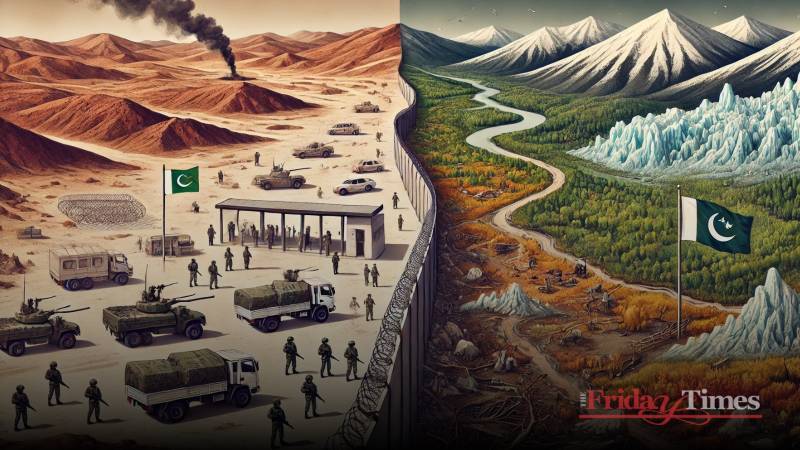
Are we securitising the right threats? This question forms the warp and woof of most of the discourse on the comparison between human and national security. Securitisation is a term used in the international relations literature that signifies according to top priority to a security threat. Any issue that might have lain dormant, gathering dust and failing to raise any hackles, can be posted front and centre on the national security billboard by raising its profile as a national security threat.
Our routine soused sensibilities get inured of the shocks of death and destruction, wrought by disease, pestilence, drought, and deaths due to polluted drinking water, malnutrition, and continually worsening air quality. Contrarily, the gory and the macabre events catch national attention quickly, as is evident in the shape of disproportionate attention to threats like terrorism, crime, and wars. The visceral of the national response to a cross-border attack that results in the killing of a few border guards is in sharp contrast to the phlegmatic public response to the loss of a complete village to the flash floods due to climate change.
According to a research study of 56 countries by Andrej Zwitter & Jaap de Wilde, covering a period of ten years (1994-2004), human fatalities due to acts of terrorism were just 5% of the traffic accident-related fatalities. But despite this disproportionality, the global focus was more on terrorism compared to traffic accidents. The reason obviously was the absence of the state focus on traffic-related deaths, whereas the terrorism-related deaths were elevated to the level of an existential threat that merited extraordinary response including suspension of civil freedoms domestically, and foreign invasions externally.
When an issue that appears threatening is raised to the level of a national security threat it becomes worthy of special attention and preferential allocation of resources compared to other concerns, that may hold more importance yet get less attention. The issues pandering to sensations and emotions, sometimes anchored in primeval passions, and sometimes rooted in historical animosities, therefore get an unfair advantage over the issues that may be less glamorous yet more damaging for human security. Framing an issue therefore as a national security threat is very important as it would ultimately set the national priorities and determine the spending pattern of precious national resources.
Pakistan needs to prioritise and then securitise the threats to its human as well as national security, keeping in mind the price of wrong choice of the threats that have resulted in the misallocation of the national resources
Some historical examples of securitising the wrong options include the Japanese securitisation of martial honour, which in their opinion was in danger due to the colonial expansion of rival powers, and which prioritised raising a war machine that made one mistake too many by attacking global power i,e USA on 7 December 1941. Similarly, the Nazi leadership of Germany securitised the threat to the Aryan racial purity in the shape of a beastly response now known as holocaust. In recent times the Israelis have securitised the threats to settler colonialism that leads to continual repression in the West Bank and genocide in Gaza.
A developing country in straitened economic circumstances like Pakistan needs to pick up its fights and threats rather adroitly, so as not to fritter away the limited financial resources at its disposal. The nuclear capability should give Pakistan the requisite confidence to concentrate on non-military threats that adversely impact its human security indices like food security, water scarcity, educational deficit, and economic security. Why air quality degradation, water scarcity, and population explosion have not been securitised and elevated to the level of a national security threat is a question that needs to be asked in the interest of national security.
Had water scarcity been securitised earlier the nation would have understood the need for the construction of big dams like the Kalabagh Dam and the conservation of precious drinking and irrigation water. Had our policy planners understood the threat to food security posed by shrinking arable land they would have securitised agriculture, imposing a ban on the use of arable land for construction. If the right threat to human health in the shape of polluted air was securitised the country would have banned Euro II fuel from vehicles, especially the two-stroke polluting machines belching poison in urban conurbations throughout the country.
If deforestation was securitised as an environmental threat, then the days of the timber mafia would have been numbered. But no luck on that score just as there is no luck with raising border smuggling to the status of a national security threat. Despite best efforts, the internal interest groups and crime mafias raking in the proceeds of illegal activities including border smuggling have not been reined in. The reason is that the whole spectrum of illegal activities is so far out of the pale of national security threats.
Lastly, the single most existential threat to the country’s human as well as national security is economic security. Has that threat been securitised as a national security threat? The answer appears to be a no as the divisive politics and the resultant hybridity in governance have failed to mount a cohesive national response in the shape of sustainable structural reforms to the threat of economic insolvency constantly staring the country in the face.
Pakistan needs to prioritise and then securitise the threats to its human as well as national security, keeping in mind the price of wrong choice of the threats that have resulted in the misallocation of the national resources towards issues that drain national resources without building the economic sinews and the human resilience.
Securitise dams, environmental degradation, industrial productivity, environmental degradation, and human health, and the value of securitisation of the right threats would soon be evident to all.

